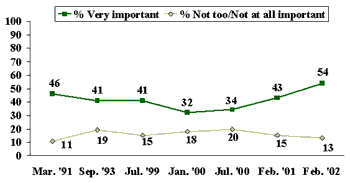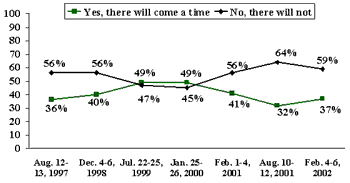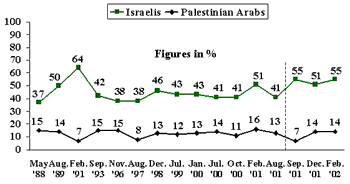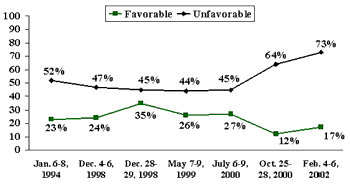GALLUP NEWS SERVICE
PRINCETON, NJ -- Hostilities between Israelis and Palestinians have increased in recent days, following the deaths of six Israeli soldiers in a Palestinian ambush on Tuesday and seven Palestinians in an Israeli counterattack on Thursday. A recent Gallup poll underscores the importance that Americans place on the United States helping develop peace between the Israelis and the Palestinians. At the same time, the poll shows that Americans continue to be heavily in favor of the Israelis in the conflict, and that Americans' perceptions of Palestinian leader Yasser Arafat are growing increasingly negative.
Peace in Middle East Seen as Increasingly Important Goal
The poll, conducted Feb. 4-6, before the most recent wave of violence, reveals that 54% of Americans think the development of a peaceful solution to the Israeli-Palestinian conflict should be a very important U.S. foreign policy goal. This represents an increase of 11 percentage points compared to last year's 43%.
| Peace in the Middle East as a Policy Goal for the United States |
 |
Compared to other long-running conflicts overseas, Americans accord the greatest importance to finding a peaceful solution to the Israeli-Palestinian situation. Slightly less than half, 47%, believe developing peace between India and Pakistan should be a very important goal of U.S. foreign policy, and only one in four say this about the conflict in Northern Ireland.
While many Americans consider peace in the Middle East to be an important policy goal, a similar number is skeptical that peace will ever come to the Israelis and Arabs there. Americans have become more pessimistic over the last two years about peace prospects in that region. The most recent poll shows that 59% of Americans say peace will not come to that region while just 37% say it will. This represents a shift from 1999-2000, when Americans were more divided in their assessment, and a plurality thought peace was possible.
| Peace for Israel and the Arab Nations? |
 |
Little Change in Americans' Sympathies in Middle East Conflict
Currently, 55% of Americans say their sympathies in the Middle East conflict lie with the Israelis, while just 14% say theirs lie with the Palestinians. Thirty-one percent have no opinion either way. Since Gallup first asked this question in 1988, the results have consistently been one-sided in favor of the Israelis.
| Sympathies in the Middle East Situation |
 |
The pro-Israeli sentiment is also reflected in Americans' ratings of the two sides and their leaders. By a 58%-35% margin, Americans say they have a favorable opinion of Israel. In contrast, 14% of Americans say they have a favorable opinion of the Palestinian Authority, while 76% have an unfavorable view. Only Iraq, Iran and Libya were viewed less favorably among the 25 countries rated in the poll.
The leaders of both sides are also viewed quite differently. Forty-five percent of Americans say they have a favorable view of Israeli Prime Minister Ariel Sharon, while 31% have an unfavorable view and 24% do not have an opinion. Just 17% of Americans have a favorable opinion of Palestinian leader Yasser Arafat, while 73% view him unfavorably. Americans have become increasingly negative toward Arafat over the years, as it appears many who formerly had no opinion of him or even positive opinions now evaluate him negatively.
| Opinion About Yasser Arafat |
 |
Generally, Republicans and conservatives have more positive opinions of Israel than do Democrats and liberals. For example, 68% of Republicans and 63% of conservatives say they have a favorable view of Israel, compared to 56% of Democrats and 51% of liberals. Sixty-seven percent of Republicans and 64% of conservatives say their sympathies lie with the Israelis in the conflict, while 50% of Democrats and just 37% of liberals agree.
Survey Methods
These results are based on telephone interviews with a randomly selected national sample of 1,011 adults, 18 years and older, conducted Feb. 4-6, 2002. For results based on this sample, one can say with 95 percent confidence that the maximum error attributable to sampling and other random effects is plus or minus 3 percentage points. In addition to sampling error, question wording and practical difficulties in conducting surveys can introduce error or bias into the findings of public opinion polls.
Next, I'd like your overall opinion of some foreign countries. First, is your overall opinion of [RANDOM ORDER] very favorable, mostly favorable, mostly unfavorable, or very unfavorable? How about -- [INSERT NEXT ITEM]?
Israel
|
Very |
Mostly |
Mostly |
Very |
No |
Total |
Total |
||
|
% |
% |
% |
% |
% |
% |
% |
||
|
2002 Feb 4-6 |
16 |
42 |
25 |
10 |
7 |
58 |
35 |
|
|
2001 Feb 1-4 ^ |
18 |
45 |
20 |
12 |
5 |
63 |
32 |
|
|
2000 Mar 17-19 |
16 |
46 |
20 |
8 |
10 |
62 |
28 |
|
|
2000 Jan 25-26 |
11 |
43 |
21 |
7 |
18 |
54 |
28 |
|
|
1999 May 7-9 |
15 |
53 |
19 |
6 |
7 |
68 |
25 |
|
|
1999 Feb 8-9 |
18 |
48 |
16 |
7 |
11 |
66 |
23 |
|
|
1996 Mar 8-10 |
17 |
45 |
18 |
11 |
9 |
62 |
29 |
|
|
1992 Feb 6-9 |
12 |
36 |
27 |
16 |
9 |
48 |
43 |
|
|
1991 Nov 21-14 |
11 |
36 |
26 |
11 |
16 |
47 |
37 |
|
|
1991 Sep 26-29 |
11 |
45 |
25 |
9 |
10 |
56 |
34 |
|
|
1991 Aug 8-11 |
15 |
47 |
19 |
6 |
12 |
62 |
25 |
|
|
1991 Mar 14-17 |
20 |
49 |
16 |
7 |
8 |
69 |
23 |
|
|
1991 Jan 30-Feb 2 |
28 |
51 |
10 |
3 |
8 |
79 |
13 |
|
|
1989 Aug 10-13 |
11 |
34 |
29 |
16 |
10 |
45 |
45 |
|
|
1989 Feb 28-Mar 2 |
8 |
41 |
25 |
13 |
13 |
49 |
38 |
|
|
^ |
Asked of a half sample. |
|||||||
The Palestinian Authority
|
Very |
Mostly |
Mostly |
Very |
No |
Total |
Total |
|||
|
% |
% |
% |
% |
% |
% |
% |
|||
|
2002 Feb 4-6 |
3 |
11 |
44 |
32 |
10 |
14 |
76 |
||
|
2001 Feb 1-4 ^ |
4 |
18 |
39 |
24 |
15 |
22 |
63 |
||
|
2000 Jan 25-26 |
3 |
18 |
36 |
16 |
27 |
21 |
52 |
||
|
^ |
Asked of a half sample. |
||||||||
As far as you are concerned, should the development of a peaceful solution to [INSERT ITEM, ROTATE START] be a very important foreign policy goal of the United States, a somewhat important goal, not too important, or not an important goal at all? Next, how about a peaceful solution to [INSERT NEXT ITEM]?
A. The Palestinian/Israeli situation in the Middle East
|
Very important |
Somewhat important |
Not too important |
Not at all important |
No |
|
|
% |
% |
% |
% |
% |
|
|
2002 Feb 4-6 |
54 |
30 |
7 |
6 |
3 |
|
2001 Feb 1-4 |
43 |
40 |
10 |
5 |
2 |
|
2000 Jul 6-9 |
34 |
43 |
14 |
6 |
3 |
|
2000 Jan 25-26 |
32 |
46 |
12 |
6 |
4 |
|
1999 Jul 22-25 |
41 |
41 |
9 |
6 |
3 |
|
1993 Sep 10-12 |
41 |
36 |
11 |
8 |
4 |
|
1991 Mar |
46 |
41 |
6 |
5 |
2 |
B. The situation in Northern Ireland
|
Very important |
Somewhat important |
Not too important |
Not at all important |
No |
|
|
% |
% |
% |
% |
% |
|
|
2002 Feb 4-6 |
24 |
46 |
16 |
7 |
7 |
|
2001 Feb 1-4 |
21 |
50 |
18 |
6 |
5 |
|
1999 Jul 22-25 |
23 |
46 |
16 |
8 |
7 |
C. The situation between India and Pakistan
|
Very important |
Somewhat important |
Not too important |
Not at all important |
No |
|
|
2002 Feb 4-6 |
47% |
36 |
8 |
5 |
4 |
In the Middle East situation, are your sympathies more with the Israelis or more with the Palestinian Arabs?
|
|
Palestinian Arabs |
|
NEITHER |
No |
||
|
% |
% |
% |
% |
% |
||
|
2002 Feb 4-6 |
55 |
14 |
6 |
14 |
11 |
|
|
2001 Dec 14-16 |
51 |
14 |
5 |
17 |
13 |
|
|
2001 Sep 14-15 |
55 |
7 |
4 |
20 |
14 |
|
|
2001 Aug 10-12 |
41 |
13 |
7 |
18 |
21 |
|
|
2001 Feb 1-4 |
51 |
16 |
7 |
14 |
12 |
|
|
2000 Oct 13-14 ^ |
41 |
11 |
9 |
18 |
21 |
|
|
2000 Jul 6-9 |
41 |
14 |
5 |
18 |
22 |
|
|
2000 Jan 25-26 |
43 |
13 |
5 |
21 |
18 |
|
|
1999 Jul 22-25 |
43 |
12 |
11 |
19 |
15 |
|
|
1998 Dec 4-6 |
46 |
13 |
5 |
22 |
14 |
|
|
1997 Aug 12-13 |
38 |
8 |
5 |
19 |
30 |
|
|
1996 Nov 21-24 |
38 |
15 |
6 |
14 |
27 |
|
|
1993 Sep 10-12 |
42 |
15 |
6 |
17 |
20 |
|
|
1991 Feb |
64 |
7 |
19 |
-- |
10 |
|
|
1989 Aug |
50 |
14 |
15 |
-- |
21 |
|
|
1988 May 13-15 |
37 |
15 |
22 |
-- |
27 |
|
|
^ |
Based on interviews with 821 national adults; +/- 4 pct. pts. |
|||||
|
(vol.) Volunteered response |
||||||
Do you think there will or will not come a time when Israel and the Arab nations will be able to settle their differences and live in peace?
|
Yes, there |
No, there |
No |
|
|
% |
% |
% |
|
|
2002 Feb 4-6 |
37 |
59 |
4 |
|
2001 Aug 10-12 |
32 |
64 |
4 |
|
2001 Feb 1-4 |
41 |
56 |
3 |
|
2000 Jan 25-26 |
49 |
45 |
6 |
|
1999 Jul 22-25 |
49 |
47 |
4 |
|
1998 Dec 4-6 |
40 |
56 |
4 |
|
1997 Aug 12-13 |
36 |
56 |
8 |
Next, we'd like to get your overall opinion of some people in the news. As I read each name, please say if you have a favorable or unfavorable opinion of this person -- or if you have never heard of him. How about – [ITEMS ROTATED]?
A. Israeli Prime Minister, Ariel Sharon
|
|
|
Never |
No |
|
|
2002 Feb 4-6 |
45% |
31 |
11 |
13 |
B. Palestinian Leader, Yasser Arafat
|
|
|
Never |
No |
|
|
% |
% |
% |
% |
|
|
2002 Feb 4-6 |
17 |
73 |
3 |
7 |
|
2000 Oct 25-28 |
12 |
64 |
6 |
18 |
|
2000 Jul 6-9 |
27 |
45 |
8 |
20 |
|
1999 May 7-9 |
26 |
44 |
6 |
24 |
|
1998 Dec 28-29 |
35 |
45 |
5 |
15 |
|
1998 Dec 4-6 |
24 |
47 |
9 |
20 |
|
1994 Jan 6-8^ |
23 |
52 |
8 |
17 |
|
^ Asked as "P.L.O. Chairman" |
||||
